Good yields on larger Bangkok apartments reflect the Thai capital's moderate price rises.
Thailand’s housing market is now cooling. There´s been tighter mortgage regulation, higher interest rates, and slowing economic growth, not to mention the country’s volatile political situation. Yet investors in larger apartments could be well rewarded.
The average price of single-detached houses rose by 3.1% (2.3% in real terms) during the year to Q1 2019, down from y-o-y rises of 4.5% in Q4 2018, 6.2% in Q3, 6.3% in Q2 and 7.1% in Q1, according to the Bank of Thailand (BoT). During the latest quarter, house prices increased 2.1% (2.3% in real terms) in Q1 2019.
For other property types:
- Condominium prices rose slightly by 1% (0.3% in real terms) during the year to Q1 2019, a sharp slowdown from last year’s 6.3% growth. However during the latest quarter condo prices fell 2.3% (-2.1% in real terms).
- Townhouse prices rose by 7.3% (6.5% in real terms) during the year to Q1 2019, the biggest y-o-y increase in four years. During the latest quarter (Q1 2019), townhouse prices rose 3.6% (3.9% in real terms).
Land prices are rising modestly. The land price index rose by 3% (2.2% in real terms) y-o-y in Q1 2019.
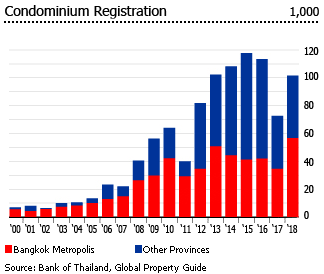
Demand continues to rise, but at a slower pace. Nationwide, land and building transactions rose by 3.8% y-o-y to THB 266.15 billion (US$8.62 billion) in the first quarter of 2019, following a 7.7% growth in 2018, according to the BoT. Residential construction activity is now falling.
Transaction volumes by region:
- Central: THB 175.37 billion (US$5.68 billion), up 7.9% from a year earlier
- Southern: THB 17.64 billion (US$571 million), up 1.8% from a year earlier
- Eastern: THB 29.81 billion (US$965 million), down 7.5% a year earlier
- Northeastern: THB 22.06 billion (US$715 million), down 4.3% a year earlier
- Northern: THB 21.26 billion (US$688 million), down slightly by 0.8% from a year earlier
Residential construction is now falling
Supply is weakening. Nationwide, condominium registrations plummeted by 44.5% to 15,037 units in Q1 2019 from a year earlier, in sharp contrast to the 40% increase in condo registrations in 2018, according to the BoT. In Bangkok Metropolis, condominium registrations fell by more than 57% y-o-y to 6,926 units in Q1 2019.
In Q1 2019:
- In Bangkok Metropolis, condominium registrations fell by more than 57% y-o-y to 6,926 units
- In other provinces, condominimum registrations fell by almost 26% y-o-y to 8,111 units
Likewise, land development licenses in the country dropped 4.9% to 19,590 units in Q1 2019 from the same period last year. However in Bangkok Metropolis land development licenses are still rising strongly by 14.7% y-o-y to 2,782 units in Q1 2019. In other provinces, land development licenses fell by 7.5% to 16,808 units over the same period.
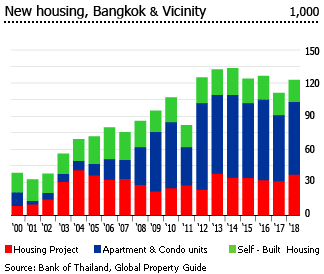
The total number of new housing in Bangkok Metropolis and vicinity plunged 40.8% y-o-y to 20,883 units in Q1 2019, according to the BoT. Over the same period, new apartments and condominium units in the metropolis plummeted by 64.5% to 7,961 units while housing projects fell by 4.5% to 7,786 units. On the other hand, self-built housing rose by 9.4% y-o-y to 5,136 units in Q1 2019.
Demand is expected to weaken
Demand is expected to slow during the remainder of the year amidst the introduction of tighter mortgage regulation. Effective April 2019, second-home buyers will be restricted to a maximum loan of 80% of the property value if the first mortgage is less than 3 years old or priced at THB 10 million (US$324,000) or higher. Third and subsequent home buyers will be restricted to a loan not exceeding 70% of the property value.
“CBRE Research believes that these measures will favour end-users with genuine demand as opposed to buy-to-rent investors with multiple outstanding mortgages.”
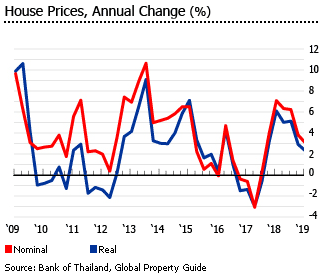
With the recent transition of government from military rule to democracy, homebuyers and property investors are also expected to adopt a wait-and-see attitude in the medium term.
The economy expanded by 2.8% y-o-y in Q1 2019, down from last year’s 3.6% growth and the slowest expansion in four years, mainly due to slowing exports caused by the U.S.-China trade war, according to the National Economic and Social Development Board (NESDB). The economy grew by 4.1% last year, the highest growth in six years. Recently, NESDB reduced its 2019 economic growth forecast to between 3.3% and 3.8%, from the initial projection of 3.5% to 4.5%.
No property bubble
Property prices have risen very modestly in Thailand in recent years, partly due to the country’s prolonged political uncertainty. From 2008 to 2017, house prices rose by just 34.2% (13.4% in real terms). In 2018, house prices rose modestly by 4.5% (3.6% in real terms) from a year earlier.
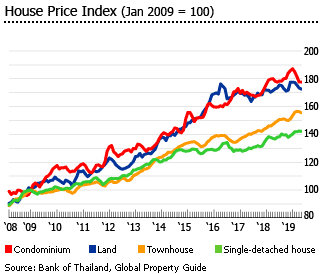
SINGLE-DETACHED HOUSE PRICES, ANNUAL CHANGE (%) |
||
| Year | Nominal | Inflation-adjusted |
| 2009 | 2.5 | -1.0 |
| 2010 | 1.8 | -1.3 |
| 2011 | 2.3 | -1.2 |
| 2012 | 7.4 | 3.7 |
| 2013 | 5.0 | 3.3 |
| 2014 | 6.5 | 5.9 |
| 2015 | 1.1 | 2.0 |
| 2016 | -0.4 | -1.5 |
| 2017 | 4.0 | 3.2 |
| 2018 | 4.5 | 3.6 |
| Sources: Bank of Thailand (BoT), Global Property Guide | ||
Real demand, not speculative demand, exists for low-rise housing below THB 3 million (US$97,150), which accounts for 70% of the market, according to Housing Business Association (HBA) president Issara Boonyong. The remaining 30% of demand comes from investors, who buy homes to generate rental income.
Larger apartments yield more
Rental yields in Bangkok range from 5.0% to 8.0%, based on Global Property Guide research conducted in June 2019. Over the past three years, we´ve seen yields on medium-sized apartments (120 sq. m.) rise significantly.
In most countries’ major cities, smaller apartments earn higher rental yields than bigger apartments. That’s not true in Bangkok. A 60-square metre (sq.m.) apartment in Bangkok’s central location now earns gross rental yields of around 5.6%, while a 120-sq. m apartment also centrally located, earns gross rental yields of around 8.0%.
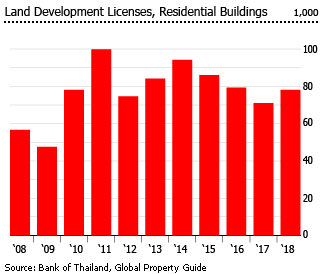
Yields have risen at the luxury end of the market, though since last year they have fallen for very large sizes, such as 250 sq. m.
The apartments included in the survey are located in Bangkok’s upscale residential areas which includes Sukhumvit Road, Silom, Sathorn, Riverside, Rama III, and Central Lumpini.
Mortgage lending up; interest rates rising gradually
Personal housing credits rose by 7.8% y-o-y in 2018 to THB 2.24 trillion (US$72.69 billion), according to the BOT. Total property credits outstanding rose by 8.5% in 2018, to THB 2.94 trillion (US$95.22 billion). In April 2019, personal housing credits and total property credits outstanding rose further by 9.7% y-o-y and 9% y-o-y, respectively.
The size of Thailand’s mortgage market grew to about 18% of GDP in 2018, up from 17.5% of GDP in 2017 and 13.2% of GDP a decade ago.
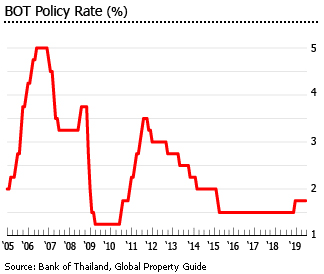
Low interest rates buoyed property demand in recent years. In June 2019, the Bank of Thailand kept its benchmark interest rate at 1.75%, after raising it by 25 basis points in December 2018, in an effort to buoy the slowing economy while preserving financial stability.
In 2016, the government launched the “ Baan Pracha Rath ” program, mandating state-owned banks, including the Government Housing Bank, Government Savings Bank, and Krungthai Bank, to provide a total of THB 70 billion (US$2.27 billion) of soft loans to both housing developers (pre-finance) and low-to-middle income homebuyers (post-finance). Of which, THB 30 billion (US$972 million) of loans are offered to property developers while the remaining THB 40 billion (US$1.3 billion) are allocated for citizens who purchase residential units at a price not exceeding THB 1.5 million (US$48,600).
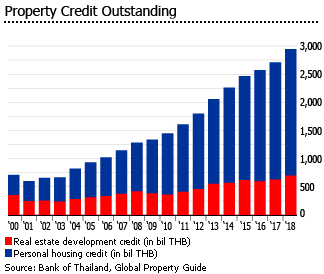
Last year, the Government Housing Bank has launched the one million-unit low-cost housing project, which gives low-income households the opportunity to buy affordable houses. The project, which was extended until December 2020, had already provided loans worth THB4.3 billion (US$139.25 million) to more than 6,300 people. Additional loans worth THB10 billion (US$323.84 million) are expected to be approved this year.
Foreign homeownership rules
Foreigners cannot buy land in Thailand, only condominium units and apartments. Foreigners cannot make up more than 40% of the condominium’s unit-owners. However, a foreigner can buy a whole building, minus the land on which it is built.
In recent years, minor changes in Thai law have allowed nonresidents to further explore the Thai real estate market. A foreigner can have a 30-year renewable lease, under which the buyer registers at the Land Office an option to renew the lease contract indefinitely, for further 30-year periods.
There are serious drawbacks to this lease arrangement, however. Lease renewals cannot be registered, and are not effective against a purchaser of the property. And the lessee cannot (without the lessor’s consent) sublease, sell or transfer his or her interest.
Another option is to set up a private limited company with mixed Thai and foreign ownership, the foreign ownership being 49% or less. Companies are allowed to own land. The foreign national can control the company by using a legal power of attorney from the Thai shareholders, handing control to the foreign directors, or through assigning greater voting rights to the foreigner partner/s. This is an effective and time-tested route, most commonly taken by foreigners. The help of a lawyer is very important.
Foreigners can also invest at least THB40 million (US$1.3 million) in a Board of Investment approved project. They will then be allowed to purchase up to 1 Rai (1,600 square meters) of land.
Economy slowing, amidst falling exports
Recently, Thailand´s NESDB reduced its 2019 economic growth forecast to between 3.3% and 3.8%, from the initial projection of 3.5% to 4.5%, largely due to the impact of the U.S.-China trade war.
The Thai baht has appreciated against the US dollar by 16.2% since January 2016, reaching an average exchange rate of THB31.105 = USD1 in June 2019. The baht is now amongst Asia’s best performers, underpinned by foreign inflows and record reserves of more than US$200 billion.
Thailand’s large current account surplus, which is partly driven by its strong tourism, also supports the baht since it means that the nation is less dependent on foreign currencies.
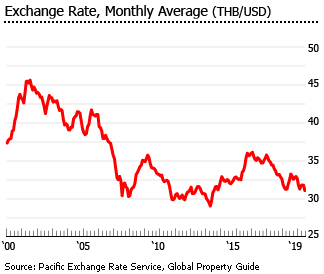
Exports, Thailand’s key economic driver, fell by 5.8% to US$21.02 billion in May 2019 from a year earlier – the seventh consecutive month of y-o-y decline and the lowest level in almost three years, as shipments of automobiles and parts, electronics and oil declined amidst the ongoing global trade tensions. On the other hand, imports fell slightly by 0.6% y-o-y to about US$20.84 billion in May 2019. This yielded a trade surplus of just US$180 million, sharply down from US$1.34 billion a year earlier.
Total exports are expected to rise by just 2.2 this year, a sharp slowdown from growth of 6.7% in 2018 and 9.9% in 2017.
Yet tourism remains vibrant. In 2018, Thailand welcomed a record 38.27 million tourists, up 7.5% from a year earlier. Tourist arrivals are expected to breach the 40 million mark this year while revenues are projected to grow by 9.5%, according to the Tourism Authority of Thailand. Tourism accounts for 12% of Thailand’s economy.
Recently, the Thai government announced that the visa-on-arrival fee waiver for citizens of 20 countries, which was first introduced in November 2018, is extended for another six months until October 31, 2019, in an effort to boost tourism further, especially from China.
In May, headline inflation stood at 1.15% while core inflation was 0.54%. Nationwide inflation is projected at 1% this year, within the lower band of the BOT’s target range of 1% to 4%, according to the central bank.
PM Prayuth declares end of military rule
In July 2019, Prime Minister Prayuth Chan-o-cha formally resigned as the head of military government and declared that the country would now function as a normal democracy after five years of military rule.
“Thailand is now fully a democratic country with a constitutional monarchy, with a parliament whose members are elected,” Prayuth said. “All problems will be addressed normally based on a democratic system with no use of special powers.”
The junta, which had given itself sweeping powers without oversight, was dissolved with the inauguration of the new Cabinet. But critics remain doubtful, as most of the powerful cabinet positions will be held by former members of Prayuth’s military government. Prayuth will also serve as a defense minister in the new government. The military also keeps its power of arbitrary detention, which was used in the past to silence critics.
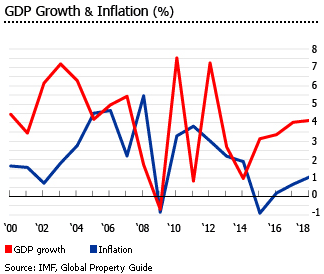
Prayuth was retained as prime minister with the backing of military-appointed Senate and pro-military parties in the parliament elected during the March 2019 general election. The election, which was marred with controversies and irregularities, was held under a new constitution and laws enacted by the junta aimed at disadvantaging established political parties and keeping any single party from winning a clear majority.
Also, the new constitution more or less ensures that members of the National Council for Peace and Order (NCPO), the official name of the military junta that governed the nation, will not be held accountable for any rights violations committed during its rule.
Thailand’s military seized power from an elected government in May 2014, the 12th military coup since the end of absolute monarchy in 1932. Led by the present prime minister, Prayuth, the coup came after several months of protests against the ruling Pheu Thai party and former PM Yingluck Shinawatra. After dissolving the government and the Senate, the NCPO vested both executive and legislative powers in its leaders, and took control of the judicial branch. A nationwide martial law and curfew were declared; political gatherings were banned; opposition leaders and activists were arrested; and media and internet censorship was imposed.
Sources:
- Economic indices and indicators (Bank of Thailand): https://www.bot.or.th/English/Statistics/EconomicAndFinancial/EconomicIndices/Pages/default.aspx
- Interest Rates in Financial Market (Bank of Thailand): https://www.bot.or.th/English/Statistics/FinancialMarkets/InterestRate/Pages/StatInterestRate.aspx
- Real Estate Market Outlook 2019 Thailand (CBRE): https://www.cbre.co.th/media/research_lang_file/2736/Thailand-Market-Outlook-2019_EN.pdf
- World Economic Outlook Database (International Monetary Fund): https://www.imf.org/external/pubs/ft/weo/2019/01/weodata/index.aspx
- Bangkok property - yields on larger apartments moderately good (Global Property Guide): https://www.globalpropertyguide.com/Asia/Thailand/Rental-Yields
- Monetary Policy Committee’s Decision 4/2019 (Bank of Thailand): https://www.bot.or.th/Thai/MonetaryPolicy/Documents/PressMPC_42019_67MGQ10.pdf
- Government Housing Bank (GH Bank) extends low-cost housing project (Thailand Business News): https://www.thailand-business-news.com/banking/72692-government-housing-bank-gh-bank-extends-low-cost-housing-project.html
- Thai exports fell by -5.8%YOY in May 2019 (Thailand Business News): https://www.thailand-business-news.com/economics/74110-thai-exports-fell-by-5-8yoy-in-may-2019.html
- Thailand Exports (Trading Economics): https://tradingeconomics.com/thailand/exports
- Thailand Balance of Trade (Trading Economics): https://tradingeconomics.com/thailand/balance-of-trade
- Thailand Imports (Trading Economics): https://tradingeconomics.com/thailand/imports
- Thailand Election Results Signal Military’s Continued Grip on Power (The New York Times): https://www.nytimes.com/2019/05/09/world/asia/thailand-election-results.html
- Tourism Authority of Thailand downgrades revenue from tourism in 2019 (The Thaiger): https://thethaiger.com/hot-news/tourism/tourism-authority-of-thailand-downgrades-revenue-from-tourism-in-2019
- Record 38.27m tourists in 2018; 41m expected in 2019 (Bangkok Post): https://www.bangkokpost.com/business/1619182/record-38-27m-tourists-in-2018-41m-expected-in-2019
- Thailand extends visa-on-arrival fee waiver until 31 October 2019 (TAT News): https://www.tatnews.org/2019/05/thailand-extends-visa-on-arrival-fee-waiver-until-31-october-2019/
- Thai parliament elects ex military government chief Prayuth as PM (BBC News): https://www.bbc.com/news/world-asia-48537664?intlink_from_url=&link_location=live-reporting-story
- New Thai leader keeps junta powers of arbitrary detention (Rappler): https://www.rappler.com/world/regions/asia-pacific/235067-new-thai-leader-keeps-junta-powers-arbitrary-detention
- With new Cabinet, Thailand replaces junta with army allies (The Public’s Radio): https://thepublicsradio.org/article/thailands-new-cabinet-sworn-in-ending-rule-by-army-junta
- Thai prime minister declares end of military rule (Reuters): https://www.reuters.com/article/us-thailand-/thai-prime-minister-declares-end-of-military-rule-idUSKCN1UA1D4